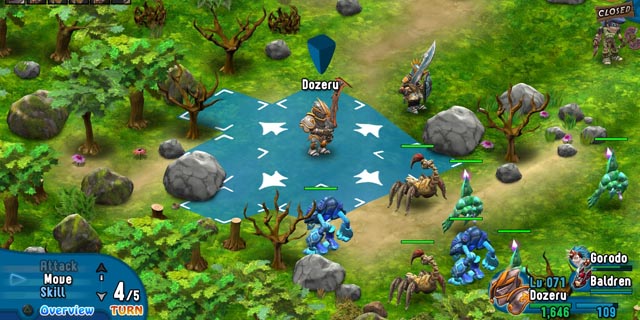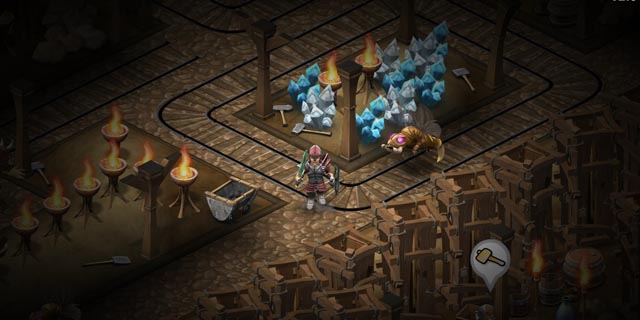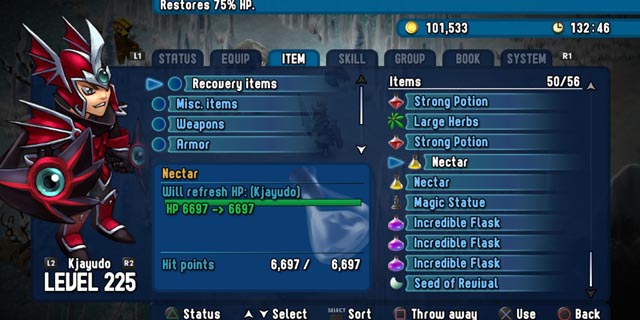
Rainbow Moon, the latest from Soldner-X makers Eastasiasoft and SideQuest Studios, is their take on the strategy RPG genre. It’s not your straightforward Japanese-style interpretation, as the Hong Kong-based team has mixed genre tropes with a distinct aesthetic and a day-night system that carries over from overworld dungeon-grind-style exploration to turn-based tactical battles.
The main hero (called Baldren by default) is thrown through a portal to Rainbow Moon during a battle with (what else) an evil thing trying to take over the world, and you’ll spend most of your time trying to get him back to save his people. In the meantime, you have quests. Lots of quests. Ready to collect lots and lots of random items for people? It’s what you’re doing, all the time. Getting to that point, though, sends you out into the wilderness to grind and gather.

It’s a bit different for a strategy RPG to have a contiguous overworld, and even weirder for it to have a hunger meter and food to eat, but those are totally here. HP and MP don’t reset after battles, and surviving becomes the main goal. Luckily, you don’t have random battles. Enemies appear on the overworld and are walked into to start combat, and though there are random encounters, too, those are totally optional and triggered with a button press if you think you’re up to it. Most of the time here, you’ll be managing your inventory to feed yourself, use torches at night to see and juggle the spaces in your initially-limited inventory.
Once you get into the turn-based battles, that’s when it feels a bit familiar. You take turns moving units around in a grid-based arena, attacking and using skills. The tactics are a bit different, though, as you have “sub-turns” to dole out. Moving a space? That’s one sub-turn. Attacking is a sub-turn too, as is using a skill or item. What this means is that positioning is key. Enemies aren’t really weaker (unless you over-grind), but they’re poor tacticians, and you’ll be thankful for that. If you’re next to an enemy, you can attack over and over, but they can do the same. You end up trying to position yourself so that one enemy ends its mad rush toward you each turn with its last action, so you can mow it down on your turn and not suffer damage.

The skills are executed in a similar way to games like Disgaea. They hit certain spots on the board, you face in a direction, hit execute and watch as some increasingly-crazy-as-the-game-goes-on animation plays out. They don’t bog down the experience too much, because you are always low on MP and have to find a camp, use an item or pay a town healer to get that MP back. Making it a precious resource is a good call, as it means you have to pick and choose the most crucial times to use them.
One thing that holds Rainbow Moon back is its downloadable content scheme. Defeating enemies and opening chests get you items, but they also get you two key currencies: Rainbow Coins and Rainbow Pearls. Coins are money, and it’s tough to gather what you need to keep up with the proper equipment and healing items. Rainbow Pearls are used to buy stat upgrades, and though they’re capped at every level, you don’t come close to maxing out what it allows. These are fun to manage, but Eastasiasoft chose to put low-cost, high-amount packs of these for each character out as DLC, throwing the balance of the game all out of whack. We’d say avoid the DLC, but it feels like sometimes the game is designed to make you just desperate enough for the progression to buy ’em.
Even with that issue, there’s a lot here to enjoy. You can upload your progress to leaderboards, tailor your characters’ strengths to suit your purposes and just get lost in a game that can capture your attention for hours. Most importantly, Rainbow Moon tries new things in a genre that doesn’t very often, and it manages to succeed most of the time. The amount of time you can sink into it makes it a ludicrous value proposition at $15, so if it seems interesting to you, give it a shot.
Pros: Great art style, surprisingly-refreshing battle mechanics, survival antics in a genre that’s never had them
Cons: Abusive DLC scheme, scatterbrained quest structure, general tedium



















